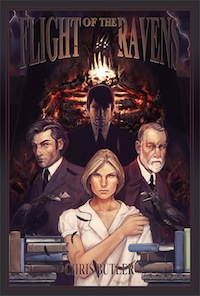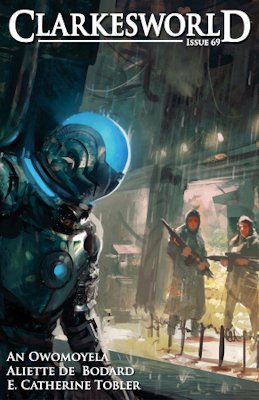Welcome back to the Short Fiction Spotlight, a weekly column on Tor.com co-curated by myself and the marvellous Lee Mandelo, and dedicated to doing exactly what it says in the header: shining a light on the some of the best and most relevant fiction of the aforementioned form.
You are, of course, cordially invited to read along with us. Indeed, we’d adore it if you did, so where possible we’ll be providing links to select stories—and advice on how to get hold of those that aren’t available for free. I’ll try to give you advance warning about what we’re reading next, as well.
This time on the Short Fiction Spotlight, I’ll be concluding my examination of the BSFA’s Best Short Story shortlist with reviews of “The Flight of the Ravens” by four-time nominee Chris Butler, and “Immersion” by Aliette de Bodard, who actually won the award in 2010. One of these stories wears the science of its fiction on its sleeve; the other, however, seems to me strangely out of place considering the competition.
 “The Flight of the Ravens”
“The Flight of the Ravens”
by Chris Butler
In the year 1889, childhood friends Bernard and Elizabeth are essentially inseparable… until a deadly game divides them forever after. The BFFs cannot resist investigating an abandoned building, nor, alas, can its occupant—some sort of a soul-sucking vampire, complete with red wine and a raven—resist the visiting children. He vanishes Bernard, to devour at a later date, and casts Elizabeth out, alone yet alive, that she may remember this terrible day.
Ten years passed, years in which Elizabeth lived with the certain knowledge that there were monsters in the world and they would consume you if you did not adequately protect yourself. To that end, she learned all she could of the magical nature of the world.
Fast forward to the turn of the century, during which period the bulk of this gloomy tale takes place. Even now, Elizabeth is unable to talk about the events of that fateful night, but Bernard’s father has taken an interest in her development in any event. In fact, she and Huginn have becomes fast friends themselves.
The loss has so overwhelmed Huginn’s wife, however, that a certain turn-of-the-century psychologist—let’s play Spot the Sigmund!—has had to take her into his care.
Then, when a parent comes to the school where Elizabeth currently works to enroll his son as a new student, Elizabeth finds herself falling for yet another father figure. But there is more to Lukas Nostrand than meets the eye, and only Huginn seems to see it.
Though Chris Butler has been nominated for four BSFA awards before, “The Flight of the Ravens” is the first of his stories to hit the shortlist proper, and I dare say it takes a certain amount of creativity to think of it as science fiction in any sense.
Indeed, whilst reading through it for this edition of the Short Fiction Spotlight, I was waiting for the other shoe to drop; for some aspect of the narrative to be unmasked as science fictional in some way. But no. No such turns occur. The closest we get to the tropes typical of that category is a black hole in someone’s belly—but this is an incidental glimpse at best. At bottom, “The Flight of the Ravens” is a fairly straightforward story about gods and monsters.
Huginn and Muninn were the ravens of Odin, king of the Norse gods. The ravens were brothers. Huginn was the thoughtful one, interested in the why of thing, while Muninn sought to unlock all the mysteries of the world, to know the what and the how. […] In times of war, the ravens were intelligence-gatherers. In the times between wars, they brought Odin knowledge and understanding of the worlds, so that he, already the wisest of gods, could become wiser still.
Call it historical horror, or dark fantasy perhaps, but whatever you do, don’t think of “The Flight of the Ravens” as science fiction. It simply isn’t. Which leaves me wondering why in the world the British Science Fiction Association opted to shortlist it for an award.
That said, this is the same organisation who crowned Coraline as the year’s Best Short Story in 2002. Read into that what you will.
So “The Flight of the Ravens” is a far cry from sci-fi. Nor, by most measures, could you call it short fiction. At almost 100 pages long, with 25 short chapters, several narrative perspectives, three time periods and scenes taking place from Frankfurt to Amsterdam—not to mention Vienna—Chris Butler’s novella has markedly more opportunity to (ahem) spread its wings than any of this year’s nominees for the BSFA’s Best Short Story trophy… yet it lacks the impact of even the least of these.
The premise is nothing new; the scattershot narrative is, shall we say, strangely paced; and through it all, the denouement is a forgone conclusion, albeit one with an interesting twist.
Thus, our penultimate contender seems utterly out of place on this specific shortlist, but leaving aside questions of form and content, “The Flight of the Ravens” is a fine, if not sublime story, with absorbing characters, an authentic setting and undeniably admirable ambitions. Though I struggle to understand what the British Science Fiction Association see in said, overall I enjoyed the experience of reading it regardless.
“The Flight of the Ravens” by Chris Butler was published by Immersion Press in September 2012. You can buy a copy of the novella here.

“Immersion”
by Aliette de Bodard
However much we pride ourselves on our uniqueness, from time to time, I warrant we’ve all wished we were different—which is to say, we’ve every one of us wanted to be more like someone else, and less like ourselves, if only for an instant.
Fitting in is evidently a tempting premise. To be, for a time, a little prettier, or a little wittier; I wonder what we wouldn’t give for an opportunity to do so. Failing that, we can always fake it till we make it.
But it’s not so easy to change who we are—even briefly—nor indeed should we, because what does being one of a number win us, ultimately? Consider, in contrast, all that we would lose, were we to flick some transformative switch.
In her BSFA award-nominated short story, Aliette de Bodard, author of the Obsidian and Blood books, gives voice to that very idea via the immerser, a device which essentially corrects “abnormal” thought processes—but at what cost? And who’s to say what normal is, anyway?
Winningly, “Immersion” begins with this telling address in the second person:
In the morning, you’re no longer quite sure who you are.
You stand in front of the mirror—it shifts and trembles, reflecting only what you want to see—eyes that feel too wide, skin that feels too pale, an odd, distant smell wafting from the compartment’s ambient system that is neither incense nor garlic, but something else, something elusive that you once knew.
You’re dressed, already—not on your skin, but outside, where it matters, your avatar sporting blue and black and gold, the stylish clothes of a well-travelled, well-connected woman. For a moment, as you turn away from the mirror, the glass shimmers out of focus; and another woman in a dull silk gown stares back at you: smaller, squatter and in every way diminished—a stranger, a distant memory that has ceased to have any meaning.
The author’s unusual choice of perspective renders “Immersion” immediately engaging, and it proves doubly powerful throughout, not least because it works to obscure the identity of our central character; a clever technical reflection of the identity crisis Aliette de Bodard suggests in the story’s opening moments.
The setting of “Immersion” is equally considered, I think. The entirety of the tale takes place on Longevity Station, an independent yet isolated spaceport where a commingling of distinct cultures clash. I admit to picturing Deep Space 9 in my mind’s eye; an appropriate point of reference given this story’s focus on trade and tourism. In any event, Longevity allows the author to realise the potential of her premise, particularly when our unknowable narrator crosses paths with Quy.
Quy, whose third person POV punctuates the aforementioned sections, is a wistful young woman who works under Second Uncle in her grandmother’s Rong restaurant. When she’s called in on her day of rest to facilitate an important meeting, Quy comes face to face—or perhaps only avatar to avatar—with a client in real danger of disappearing, so long has she had her immerser on.
That latter’s rationale for relying so heavily on said, whispered so innocently in her ear, illuminates one of this story’s darkest aspects:
People like you […] have to work the hardest to adjust, because so much about you draws attention to itself—the stretched eyes that crinkle in the shape of moths, the darker skin, the smaller, squatter shape more reminiscent of jackfruits than swaying fronds. But no matter: you can be made perfect; you can put on the immerser and become someone else, someone pale-skinned and tall and beautiful.
In this way, Aliette de Bodard draws attention to the difficult, not to mention discomfiting question “Immersion” asks: if, after all, we can so utterly alter ourselves at the touch of a button, where do we draw the line, and why? Surely it cannot be right to reorient our race, but what about class and gender and other such issues? When we can be anyone we want, who are we really?
Striking yet subtle, thoughtful but not ponderous, and ultimately uplifting, “Immersion” is without question one of the strongest contenders on the BSFA’s shortlist. I wouldn’t be in the slightest surprised to see Aliette de Bodard take home the Best Short Story trophy for this entrancing effort.
“Immersion” by Aliette de Bodard was published in Clarkesword Magazine #69 in June 2012. You can read it for free here.
What a story to go out on!
Which is to say, “Immersion” is the last of the six shorts shortlisted for an award by the BSFA this year, and though the Short Fiction Spotlight will of course continue—Brit will be back next week, and two Tuesdays from today you and I will do something a little different—the time has finally come to consider the contenders together.
I dare say I’ve made my opinions about each of these plain in the preceding weeks, but let me reprise my position momentarily: ultimately, I’d give the trophy to either Tim Maughan for “Limited Edition” or Aliette de Bodard for “Immersion,” though I wouldn’t be surprised if China Mieville or Ian Sales ended up claiming the coveted ray gun.
Then again, “The Song of the Body Cartographer” and “The Flight of the Ravens” are in contention as well, and though I would describe them as least deserving of the Best Short award vis-à-vis the other nominees, in their own right both are worthwhile and rewarding stories.
The BSFA will announce the winner of this prized category at EasterCon in early April… but before that, let’s compare notes! Did you like today’s two tales? Which of the six nominees we’ve talked about to date would you call the one short story to rule them all?
Niall Alexander is an erstwhile English teacher who reads and writes about all things weird and wonderful for The Speculative Scotsman, Strange Horizons, and Tor.com, where he contributes a weekly column concerned with news and new releases in the UK called the British Genre Fiction Focus, and co-curates the Short Fiction Spotlight. On rare occasion he’s been seen to tweet about books, too!











Coraline was a worthy winner of the BSFA Best Short Fiction award, being a “work of science fiction or fantasy, up to and including novellas” (http://www.bsfa.co.uk/bsfa-awards/). A glance down this year’s longlist also demonstrates that fantasy is eligible and voted for in all categories (http://www.bsfa.co.uk/final-day-for-bsfa-award-nominations/).